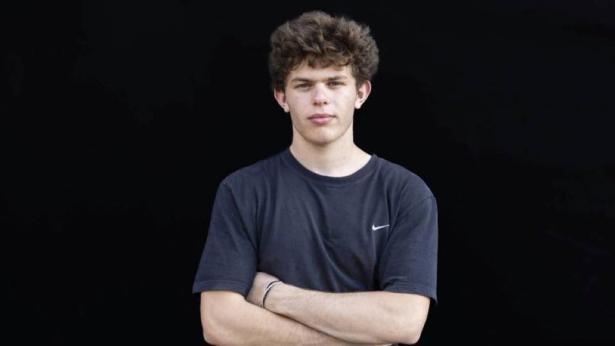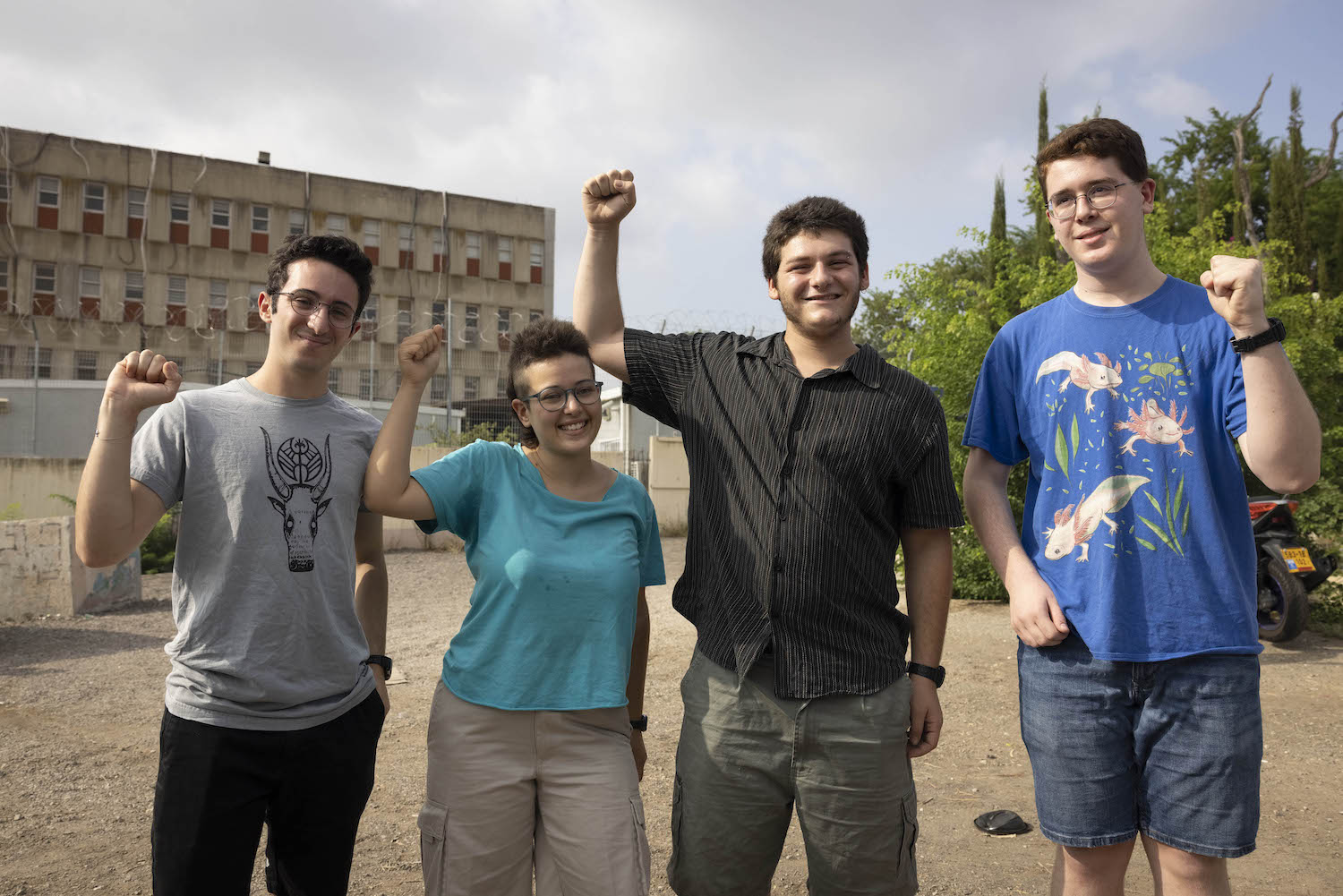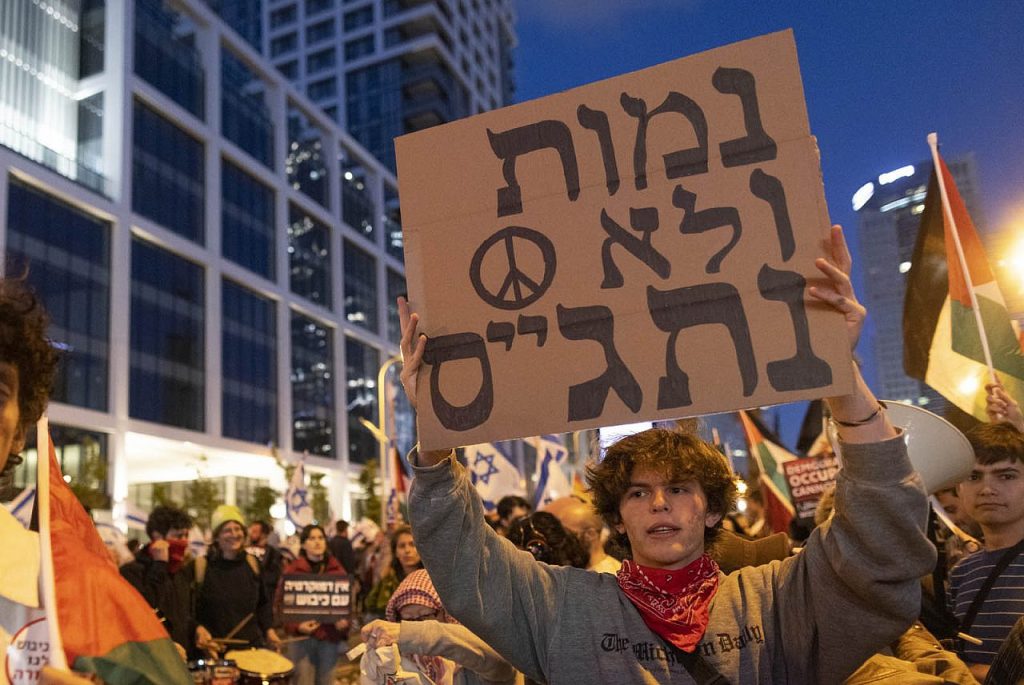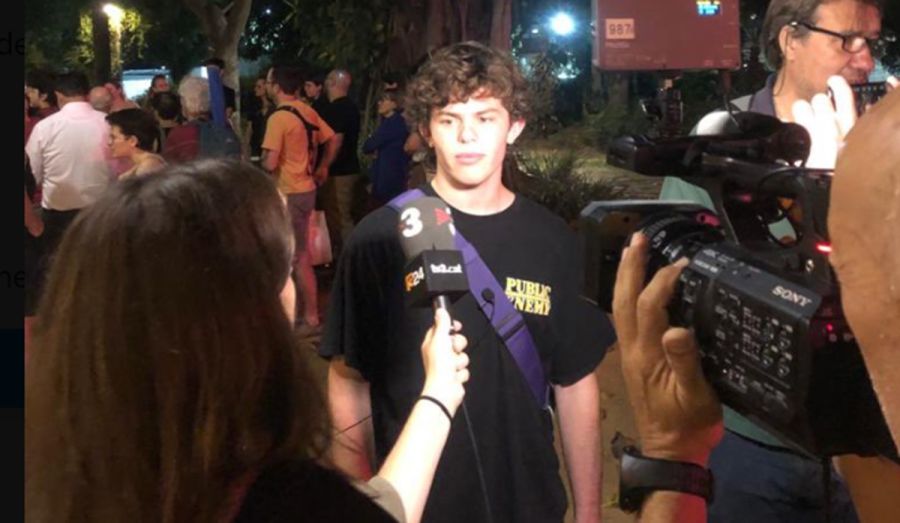‘I Refuse to Take Part in a Revenge War’

Tal Mitnick is the first Israeli conscientious objector to be imprisoned since Oct. 7. He explains why the current war has only reaffirmed his convictions
Oren Ziv / 972mag.com
(December 28, 2023) — On Tuesday, Dec. 26, 18-year-old Tal Mitnick from Tel Aviv became the first Israeli to refuse mandatory military service since Israel launched its assault on the besieged Gaza Strip more than 80 days ago. Mitnick was summoned to Tel Hashomer recruitment center, where he declared himself to be a conscientious objector, and was sentenced to 30 days in military prison.
Mitnick is one of 230 Israeli high-schoolers who signed an open letter in early September, prior to the war, announcing their intention to refuse their draft orders as part of a mobilization against efforts by Israel’s far-right government to restrict the judiciary’s power. Connecting the judicial coup to Israel’s long-standing military rule over Palestinians, the high-schoolers — who organized under the banner of “Youth Against Dictatorship” — declared that they would not join the army “until democracy is secured for all who live within the jurisdiction of the Israeli government.”
At the beginning of December, Mitnick appeared before the army’s Conscience Committee — consisting of several military representatives and one academic representative — which rejected his request for an exemption from military service. Upon declaring his refusal on Tuesday, Mitnick was immediately taken to Neve Tzedek military prison near Netanya to begin his sentence, after which he will be ordered to report again to the recruitment center. In recent years, conscientious objectors have been put through several periods of imprisonment, some reaching up to 100 days or more of incarceration.
Noa Levy, an attorney representing Israeli draft refusers on behalf of the Mesarvot network, told +972 and Local Call that since the beginning of the war, the army has largely chosen not to imprison citizens who had announced their refusal to serve. “Tal is not the first objector whose enlistment date was after the start of the war,” she explained. “Before him, there were dozens, both reserve objectors and regular service objectors. But the army found other ways to deal with them and did not send them to prison.”
In a message that sharply diverges from the mainstream Israeli public discourse amid the army’s ongoing assault on Gaza, and at a time when anyone in Israel who expresses even mild opposition to the war is facing persecution and repression, Mitnick told +972: “My refusal is an attempt to influence Israeli society and to avoid taking part in the occupation and the massacre happening in Gaza. I’m trying to say that it’s not in my name. I express solidarity with the innocent in Gaza. I know they want to live; they don’t deserve to be made refugees for the second time in their lives.”

Four Israeili teens who have burned their draft orders.
In a statement of refusal published ahead of his incarceration, Mitnick described the Hamas-led October 7 attack on southern Israel as “a trauma unlike any other in the history of the country,” but asserted that the army’s bombardment of Gaza is not the answer. “There is no military solution to a political problem,” he wrote. “Therefore I refuse to enlist in an army that believes that the real problem can be ignored, under a government that only continues the bereavement and pain.
“I refuse to believe that more violence will bring security,” he continued. “I refuse to take part in a revenge war.”
Shortly before entering prison, Mitnick spoke to +972 about his decision to refuse, the fear of entering prison in the current political climate, and the message he aims to convey to the public in Israel and in Gaza.

How did your decision to refuse enlistment come about?
Even before the first draft notice, I knew I was not interested in enlisting. I knew I wasn’t willing to serve in this system that perpetuates apartheid in the West Bank and only contributes to the cycle of bloodshed. I understood from the very privileged position I find myself in, having a supportive family and environment, that I have an obligation to use it to reach other young people and to show that there is another way.
When I talk to my friends — some of whom serve and some of whom received exemptions — about why I’m not going to the army, they understand that it comes from a humane perspective of consideration for the other. No one thinks I support Hamas or want [my friends] to experience harm. There are people who believe that military activity will bring security; I believe that my public refusal is what will influence and bring the most security.

How did the protests against the judicial overhaul help you shape your worldview?
Before the protests, I viewed political activism as something very distant, and I didn’t think it was possible to make an impact as an individual. When the protests began and I saw they included members of Knesset going out to the streets, I realized that politics is closer to me than I thought, that it can reach every corner of the country, and that it is possible to have an influence. That’s where I understood that my actions can affect the reality we see here, and I have an obligation to act for a better future.

Were you debating whether to do it now, given the current atmosphere?
Yes, there were doubts. I always knew that the army doesn’t have a consistent policy regarding conscientious objectors, that the response can change in a moment – to release all objectors or to imprison them for a long time — and I was prepared for that. After October 7 and the [government’s] attack on the peace movement, on Jewish-Arab partnership, and on Palestinian citizens expressing support and solidarity with the innocent in Gaza, even on demonstrations, it has become frightening. But now is precisely the time to show the other side, to show that we exist.

Do you think there’s anyone in the country willing to listen to such messages right now?
We all know that we need another way, especially after October 7. We all know that it simply doesn’t work, that Benjamin Netanyahu is not “Mr. Security.” Managing the conflict is a policy that hasn’t worked and eventually collapsed.
We can’t continue with the current situation, and there are two options now: the right suggests transfer and genocide of the Palestinians in Gaza; the other side says there are Palestinians here, living between the Jordan River and the Mediterranean Sea, and they are entitled to rights. Even people who voted for Bibi, and even those who supported the judicial reform, can connect to the idea that everyone deserves to live justly, that everyone deserves a roof over their heads, and support shared existence here.

After October 7, many who were on the left claimed they “sobered up”. Did this affect you?
There is no justification for harming innocent civilians. The criminal attack on October 7, in which innocents were killed, is illegitimate resistance to the oppression of the Palestinian people in my eyes. However, outlawing legitimate resistance such as protests, or declaring human rights organizations as terrorist organizations, leads people to dehumanize the other and to actions targeting civilians.
October 7 did not change my perspective; it only reinforced it. I still believe it is impossible to live with the siege on Gaza and an occupation, and not feel [any consequences]. I believe that many people finally understand this. The idea of “out of sight, out of mind” doesn’t work. Something needs to change, and the only way is to talk, to reach a political settlement. I’m not saying it will solve everything, but it will be another step toward justice and peace.
What was your experience at the Conscience Committee?
The pre-committee interviewer was aggressive. She questioned my nonviolence because I opposed the government’s actions and the occupation. Essentially, due to my opinions, she told me that I am not a conscientious objector because these were political views.
In the end, I went through the pre-committee, and appeared before the committee itself less than a week after the interview, while many people usually wait half a year. It was a hostile interview: me opposite four people.
They attacked my opinions. They asked me what I would have done on October 7, and how I would have handled the situation. They constantly interrupted me, and said they would phrase the question differently. I tried to continue answering, but they said I wasn’t responding to them. I am not the leader of Israel; they can’t place me in that position.
They asked me how my refusal is different from the refusal of Brothers in Arms [a group of army veterans who declared their refusal to show up for reserve service in protest against the judicial coup]. I replied that I appreciate them and think it’s important that there are people who have a red line for service — but I set my red line before that, and I hope their red line moves in the direction of my red line.
Two days later, they told me I hadn’t passed the committee. I wasn’t surprised. I didn’t receive any explanation, they just called and told me the result.
How do you plan to pass the time in prison?
I have a few long books, which I hope they will allow me to bring in: “Drinking the Sea at Gaza” by Amira Hass, a history of the CIA, and a history of the Mizrahi Struggle by Sami Shalom Chetrit. I spoke with conscientious objectors who were in prison before; it is definitely not a summer camp, but from what I understand, it is possible to cope with it. You just need to speak in the right way and not think that you are above anyone else.
A version of this article was first published in Hebrew on Local Call. Read it here.
To expound on the positive: There are at least 30 peace organizations* in Israel, although the left is small. This is an example of Israelis demonstrating for ceasefire.
https://www.facebook.com/reel/2330265660494520
- Endorsers and Supporters
| 1 | A Land for All – Two States One Homeland | Academia for Equality | |
| 2 | Akevot Institute for Israeli-Palestinian Conflict Research | |
| 3 | Americans for Peace Now | |
| 4 | Amnesty International Israel | | |
| 5 | B’Tselem | |
| 6 | BIMKOM – Planners for Planning Rights | | |
| 1 | Breaking the Silence: former IDF soldiers | |
| 2 | Combatants for Peace | |
| 3 | COMBATANTS FOR PEACE (Israel and Palestine) | |
| 4 | Emek Shaveh | |
| 5 | Gisha | |
| 6 | Green Olive (Israeli and Palestinian) | |
| 7 | Hamoked – Center for the Defence of the Individual | Zazim – Community Action | |
| 8 | Haqel – In Defense of Human Rights | |
| 9 | https://www.csmonitor.com/World/Making-a-difference/Change-Agent/2014/0910/13-Israeli-and-Palestinian-groups-building-peace | |
| 10 | Ir Amim | |
| 11 | Jewish Voice for Peace | |
| 12 | Kerem Navot | |
| Looking the Occupation in the Eye.. Meir Barochin | ||
| 13 | Machsom Watch | |
| 14 | Mehazkim | |
| 15 | Mothers Against Violence | |
| 16 | Other Voice | |
| 17 | Parents Against Child Detention | |
| 18 | Peace Now | |
| 19 | Physicians for Human Rights–Israel | |
| 20 | Public Committee Against Torture in Israel | |
| 21 | Rabbis for Human Rights | |
| 22 | Seeds of Peace | |
| 23 | Standing Together | |
| 24 | The Association for Civil Rights in Israel | |
| 25 | The Parents Circle-Families Forum | |
| 26 | Torat Tzedek| | |
| 27 | Women Lawyers for Social Justice | Itach Ma’aki – | |
| 28 | Women Wage Peace | |
| 29 | Yesh Din | |
| 30 | Your Neighbor As Yourself |